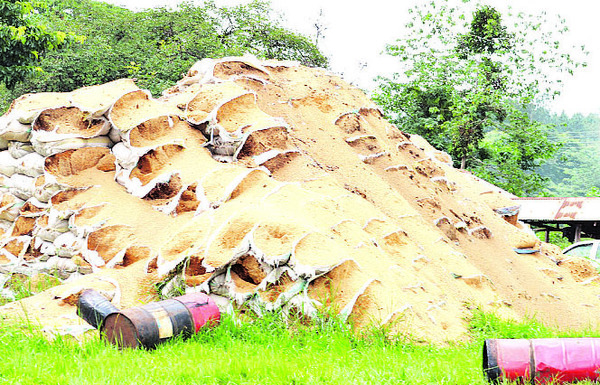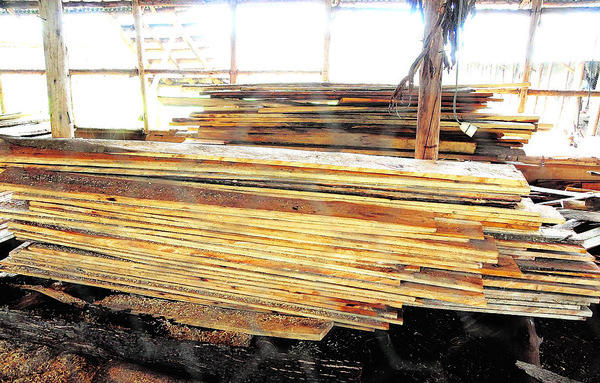How to preserve building materials
Timber absorbs moisture, so it should be stored in such a way that moisture movement is avoided.
Many developers have been affected by the COVID-19 pandemic. For instance, some had left their building materials on site, which were affected by the weather and vandalised by thieves. David Kireli, a civil engineer, says whenever one thinks of constructing a house, one must plan for the storage of building materials and equipment. Here are a few more tips...
CEMENT
Since the price of cement fluctuates, most people are tempted to buy it in bulk and store it. But do they know how long cement should be kept before it is used?
Abdu-Wahab Nyanzi, an architect, says the shelf life of cement is dependent on a number of issues. Common among these is protection from moisture. "Whereas the manufacturer could indicate a use-by date, cement in bags could expire earlier. Proper storage of building materials is key to preserving them against expiry dates.
"Cement is hygroscopic in nature. It attracts and holds water molecules from the surrounding areas," Nyanzi says. Therefore, it must be properly stored and used before it expires.
Herbert Atwine, a cement dealer in Matugga, says cement absorbs moisture if it is kept in a moist environment. This process is technically called hydration. The bagged cement then solidifies into a hard stonelike material not usable for construction. Cement can remain in good condition as long as it does not come into contact with moisture.
Nyanzi says the practice of keeping bags on timber racks or putting a waterproof cover on the floor before stacking the bags is meant to prevent moisture from entering the cement. It is for this purpose that cement bags have three to four layers.
Simon Sekankya, the director of Hardware World, advises property developers to carry out research before buying cement because not all hardware stores sell their cement quickly.
According to Nyanzi, the cement stock should be arranged in such a manner that the bags which are bought earlier are used first. If the cement is placed directly on the floor, it should be on lean cement concrete or it can be placed on two layers of dry bricks on well-consolidated earth. Also, there should not be many windows in the storage area to avoid external moisture.

LIME, SAND AND STONE
Nyanzi says lime must also be stored well because it can ruin building materials. He says both lime and cement should not be stored for a long time. Sand and stone aggregate require a clean, firm base. "One should also ensure that no foreign matter, for example, soils or rubbish, are included when extracting sand and stone," he says. Nyanzi adds that different grades should be stored differently. For example, the sand used for plastering should not be mixed with the one used for building.
Fred Lukoda, a construction expert, says storing building materials depends on whether they need to be protected from external attacks by harsh weather or even from vandalism or careless behaviour.

TIMBER
Fred Mpalanyi, a carpenter in Bukoto, says timber absorbs moisture, so it must be stored in such a way that moisture movement is avoided and that the timber maintains the moisture that it has within it. "Timber should be stored in such a way that air is allowed to flow easily and freely so that the material does not rot."
Other building necessities, such as paint, hand tools and drills, should be stored in a place that is easily accessible, as these can simply disappear and tracing them may take some time. The large items, such as windows, bathtubs and doors need secure and dry places of storage.
BUDGET
Work with professionals to lay out all the details of what the project entails in writing; specify time scales, as well as payment methods and prices. Do not forget to include the finer details, such as which toilet the builders should use and when work should start. If you have not yet purchased building materials, be sure to include that, as well as the cost of any ration improvements required in your budget.
Sometimes, it is better to pay for materials upfront. Most people fail to complete their building projects because the cost of materials may rise within the project frame. Therefore, be clear about this and plan for it.
SECURITY/RECORD KEEPING
John Sserwadda, a construction consultant, says many building materials have a high resale value or usage to people other than those for whom they were ordered. "Good site security can minimise the loss of materials. It is also important to get someone to check on the quality and quantity of the materials delivered," he says adding that keeping records of materials and the remaining stock is necessary.
DESIGN
Consider what design of house you would like to build. Would you prefer a small house or a large one? Are you considering a slab foundation or a full basement? Such choices will have direct impact on the cost and storage of construction materials, regardless of the type of architectural design chosen.
BRICKS
These should be stacked in stable piles on a levelled and well-drained surface. Where the bricks are exposed to severe atmospheric conditions, they should be covered with polythene sheeting.